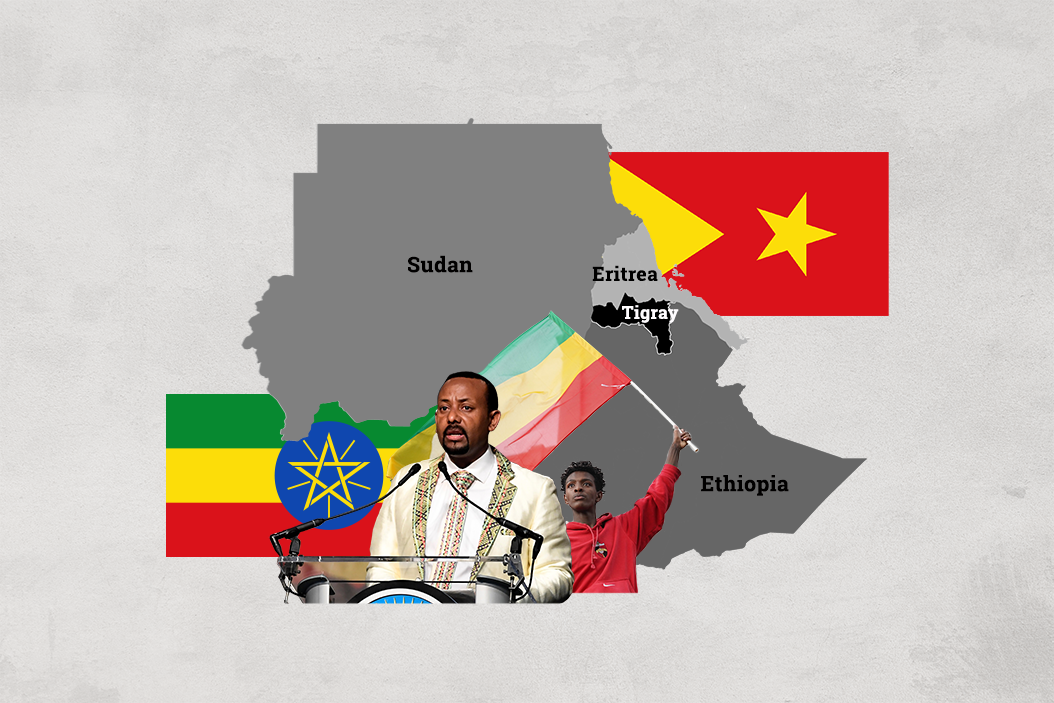November 03, 2021
Things go from bad to worse in Ethiopia. Ethiopia's embattled PM Abiy Ahmed has imposed a state of emergency and called on ordinary citizens to take up arms, after a swift advance by the Tigrayan People's Liberation Front put the rebels within striking distance of the capital, Addis Ababa. For a year now, Abiy's forces have been at war with the TPLF over the militant group's demands for the Tigray region to have more autonomy from the central government. The TPLF ran all of Ethiopia for decades, but they lost power after a popular uprising led to Abiy's appointment in 2018. The current conflict has seen possible war crimes by all sides, but the allegations against Ethiopian government forces in particular have prompted the US to revoke the country's preferential trade status, effective next year. All of this puts Abiy in a very tough position: last November he launched what he thought would be a quick war to squelch the TPLF, but now he is losing ground badly and could soon lose a critical source of economic support. Does he pull out the peace pipe or look for bigger guns? It seems like ages ago this guy won a Nobel Prize, but no heroes are safe these days. And with neighboring Sudan in political turmoil as well, things are looking dicey in the strategically-significant Horn of Africa.
Italy & Croatia spar over Prosecco. It may not be as famous as its bubbly cousin champagne, but Italy's Prosecco is actually the world's top-selling wine. And now Rome wants to make sure no one else can sell it if it's not from the Italian town of Prosecco near Trieste. No way, say Croatian winemakers, who claim that what they call "Prošek" was first made 300 years before the Italian version. The Croatians want EU protections to market the stuff under that name, but the Italians say that would just confuse people. Fizzing things up further, it turns out that Prosecco and Prošek are made with different grapes, and share little in common other than etymology and a starring role at brunch. And confusing things even more, Italians of Slovene origin love another sparkling wine called Prosekar. The dispute is a big deal because EU rules on product origin help Italy sell roughly 550 million bottles of Prosecco for $2.8 billion each year. We'll be sipping a glass of any variety of Adriatic bubbly while we wait for the EU to rule on the issue in a few months.
Fed begins "taper" as inflation won't go away. The US Federal Reserve announced on Wednesday it would cut back on its monthly purchases of Treasury bonds, the first step towards pulling back its extraordinary aid to the economy as COVID-induced inflation remains stubbornly high. Since the pandemic began, the Fed has been buying up some $120 billion worth of US government debt each month in order to boost borrowing/spending and hiring while keeping interest rates low. But now that the US economy is in better shape — despite ongoing supply-chain disruptions, that is — the Fed is worried about inflation. In fact, the Fed now (finally) admits that prices are likely going to continue rising longer than it initially predicted. We're not economists, but basically what happens next depends on how bad inflation gets: if prices keep going up, the Fed will slash its bond-buying even more, and if that doesn't work it'll take the more drastic step of raising interest rates.More For You
Michael Froman explains how the world is adjusting to Trump’s more transactional and unilateral approach to global power.
Most Popular
- YouTube
At the 2026 Munich Security Conference, NATO Parliamentary Secretary General Benedetta Berti explains why hybrid threats, from undersea cable sabotage to disinformation, energy coercion, and cyberattacks, are no longer isolated incidents but a defining feature of today’s security environment.
- YouTube
In this Quick Take from Munich, Ian Bremmer examines the state of the transatlantic alliance as the 62nd Munich Security Conference concludes.
- YouTube
At the 2026 Munich Security Conference, Brad Smith announces the launch of the Trusted Tech Alliance, a coalition of global technology leaders, including Microsoft, committing to secure cross-border tech flows, ethical governance, and stronger data protections.
© 2025 GZERO Media. All Rights Reserved | A Eurasia Group media company.
